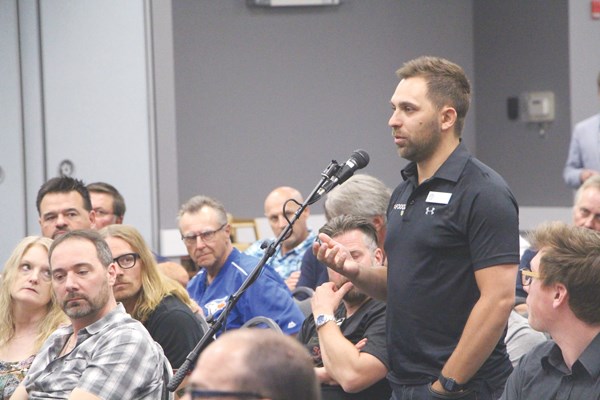Many businesses in the Yorkton area were hit with a big tax increase, especially smaller businesses in Yorkton’s downtown. In order to answer questions about how this happened, the Yorkton Chamber of Commerce was the host of an information meeting, which gave the Government of Saskatchewan, the Saskatchewan Assessment Management Agency (SAMA) and the City of Yorkton an opportunity to outline their processes, justify their budgets and answer questions about why the tax bills from 2017 wound up being so high for some businesses.
Brent Murdock, president of the Yorkton Chamber of Commerce, says that given that they are the voice of business, they decided to host the evening after hearing many questions and comments from member businesses after the tax notices came in.
“We are very happy with the opportunity for members to speak their mind, bring forth their questions and get a clear message to people who needed to hear it.”
Speaking on behalf of the Government of Saskatchewan was Greg Ottenbreit, Yorkton MLA, on behalf of SAMA was Kevin Groat, and on behalf of the City of Yorkton was Lonnie Kaal, city manager.
The crowd asked the assembled group how their business could have gone up in value so much in so little time, and questioned why the values for the assessment are based in 2015, while actual property values have gone down since. One attendee suggested everyone in the city appeal their assessment in order to get a more accurate one for next year, though the appeal window for 2016 is closed.
Ottenbreit came to the event to explain how they came up with their budget numbers, and listen to what the concerns were in his constituency. He admits that the tax system is a complicated one, by necessity, and admits that many people in the city might believe that the assessment might not have been fair.
The feedback from the city’s property owners might indicate a need to change legislation to make assessments more stable and fair for property owners, Ottenbreit admits, especially with the two year lag in the assessment system.
“I would call it an imperfect storm, it’s not perfect by any stretch of the imagination... How do we get to a point with our SUMA and SARM partners with SAMA, and also through legislation we put in place through government, that we can develop a much more responsive and fair system that reflects values more quickly so we don’t have these big shifts, but also a system where you can actually know what your assessment is on your property, but you don’t have these huge shifts.”
Ottenrbeit has suggestions of his own for changes to the assessment system, and says he will take the feedback from the meeting on board when discussing the problem in government.
“Is there a way that we can look at those properties and more fairly reflect what they use, what revenue they can generate from those, how to more fairly assess the value, but also for the municipalities to set the mill rate and give them a fair tax rate.”
Kaal agrees with the city’s business owners that changes need to be made in the future, to give businesses in the city and the province stability. She says that what happened in Yorkton is an indication that there need to be changes in the way property is assessed.
“When you have big swings in assessed value which translate into big swings in taxes, nobody likes that. The issue going forward will be to try to mitigate that. Obviously we had a big tax increase this year but I don’t think that was the biggest issue, it was the assessment shifts and drastic changes when taxes are doubling.”
Part of the problem was also timing, explains Kaal. Because the assessments came back late, thanks to a computer system upgrade at SAMA that took too long, they city was unable to consider a phase in of the assessment values.
Groat saw the evening as a good opportunity to give people an explanation for the assessments and a chance to explain the rules that SAMA operates under when they are doing them.
“We deal with people’s money, and the effects of the assessments we do, it’s very personal... People may not appreciate the rules we have to do the assessments by, but assessments are founded in legislation, we have to follow the legislative rules that are given to us.”
SAMA will operate under the rules they are given, and Groat is not going to offer an opinion on what those rules should be. If legislation changes, so will SAMA.



